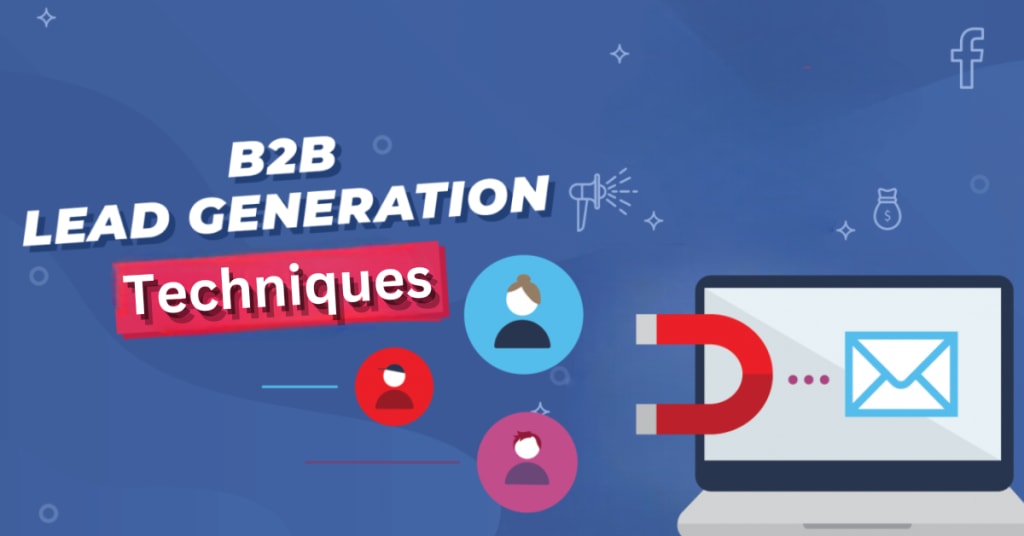Data-Driven B2B Lead Generation Techniques
Unlock High-Quality Leads With Data-Driven B2B Lead

Data-driven strategies have emerged as the cornerstone of effective lead generation strategies in the constantly evolving field of B2B marketing. Making decisions utilizing data improves the accuracy with which prospective leads are targeted and maximizes the effectiveness of all marketing initiatives. This article explores some data-driven B2B lead-generation strategies and provides insights into how companies may use data to improve lead-generating results.
Importance of Data-Driven B2B Lead Generation
In B2B marketing, understanding and leveraging data can significantly improve lead generation. By examining data from several sources, businesses may find patterns, anticipate trends, and make well-informed decisions that lead to improved outcomes. Data-driven tactics guarantee that marketing initiatives are grounded on hypotheses and verifiable facts, resulting in more successful and efficient lead generation.
Benefits of Data-Driven Lead Generation in B2B
Data-driven lead generation offers several key benefits:
Precision Targeting: Through data, companies may pinpoint and identify particular groups more likely to convert, improving marketing campaign efficiency.
Personalization: Data enables more in-depth comprehension of consumer behavior and tastes, allowing for more effective personalization of marketing messages to prospective customers.
Improved ROI: Data-driven tactics make resource allocation more efficient and increase the return on investment of marketing initiatives.
Enhanced Decision Making: Data offers insightful information that guides strategic choices and keeps companies ahead.
Key Data Sources for B2B Lead Generation
Businesses need to tap into various data sources to leverage data for lead generation effectively. Here are some key sources:
CRM Systems: CRM (customer relationship management) systems retain essential information on current and prospective clients, such as contact details, past interactions, and purchasing patterns.
Website Analytics: Businesses may learn more about website traffic, user activity, and conversion rates by utilizing tools like Google Analytics, which can help them identify the content and channels that generate leads.
Social Media Analytics: Marketing tactics may be customized using social media sites' interaction, reach, and demographic data.
Email Marketing Metrics: Email marketing tools aid firms in optimizing their email campaigns by offering statistics on conversions, click-through rates, and open rates.
Third-Party Data Providers: Additional information on market trends, competitive analysis, and industry benchmarks may be obtained from other data sources.
Effective Data-Driven B2B Lead Generation Techniques
- Utilizing Predictive Analytics for B2B Lead Gen
Predictive analytics uses statistical algorithms and past data to forecast future events. It may assist in identifying prospective leads who are most likely to convert in B2B lead gen. Businesses may use historical behavior analysis and pattern recognition to focus on high-value prospects.
- Implementing Account-Based Marketing (ABM) with Data
ABM, or account-based marketing, is a highly focused strategy that concentrates on individual clients instead of large market sectors. Data is essential to account-based marketing (ABM) because it can identify important accounts, comprehend their needs, and create customized marketing messages. By utilizing data, businesses can ensure that their ABM initiatives align with the unique needs and pain points of their target clients.
- Leveraging AI and Machine Learning in Lead Generation
B2B lead generation has been completely transformed by artificial intelligence (AI) and machine learning (ML), which automate and optimize several procedures. AI-powered systems may analyze large data sets to spot patterns and trends, forecast consumer behavior, and suggest the best action. Lead generation operations may be made more efficient and successful by using machine learning algorithms that can score leads, segment audiences, and tailor marketing messaging.
- Enhancing Lead Scoring with Data
Lead scoring is a technique for ranking possible leads according to their propensity to convert. Businesses may develop more dynamic and accurate scoring systems by adding data to lead scoring models. Leads may be scored using interaction levels, firmographic information, and behavioral indications. This helps sales teams focus on high-potential customers and increase conversion rates.
- Optimizing Content Marketing with Data
One essential element of B2B lead creation is content marketing. By revealing the kinds of material that appeal to the target audience, data may be used to optimize content marketing efforts. Businesses may determine the subjects, forms, and distribution methods that generate the most extraordinary leads by examining engagement data. Data may also be used to guide the development of customized content that speaks to potential leads' unique requirements and problems.
Best Practices for Data-Driven B2B Lead Generation
- Integrating Data Across Platforms
Effective data-driven lead creation requires integrating data from several sources into a single platform. This guarantees that marketing initiatives are well-coordinated and consistent while offering a thorough picture of possible prospects. By combining data from analytics platforms, marketing automation tools, and CRM systems, firms may obtain more profound insights and make better decisions.
- Ensuring Data Quality and Accuracy
The quality and accuracy of the data determine how successful lead creation via data is. To ensure that the data utilized is trustworthy, data cleansing, validation, and enrichment procedures must be put in place. Maintaining and updating data regularly helps prevent errors and guarantees that marketing initiatives are founded on the most recent facts.
- Fostering Collaboration Between Sales and Marketing
Sales and marketing departments must work closely together to generate leads based on data. These teams may collaborate to find high-potential prospects and customize their tactics by exchanging insights and synchronizing their plans. Sharing data and communicating with each other regularly facilitates a smooth lead-generating process.
- Continuously Monitoring and Adjusting Strategies
Data-driven lead creation is a continuous activity rather than a one-time event. It's critical to monitor how well lead generation tactics are working and adapt as necessary based on data insights. Frequent evaluation of KPIs like ROI, lead quality, and conversion rates aids in pinpointing problem areas and improving tactics for improved outcomes.
Conclusion
Techniques for data-driven B2B lead generation provide a potent means of optimizing the efficacy and efficiency of marketing campaigns. Businesses may obtain important insights, more accurately target potential prospects, and tailor their marketing messages by utilizing data from several sources. Successful lead generation may be achieved by putting predictive analytics, ABM, AI, and machine learning into practice and improving content marketing. Businesses may achieve better results and maintain their competitive edge in the B2B market by adhering to best practices, which include integrating data, guaranteeing data quality, encouraging cooperation, and regularly monitoring initiatives.
About the Creator
Hanish Arora
My name is Hanish Arora owner of Exotto is a global leader in B2B digital marketing and appointment setting services, empowering businesses worldwide. Our tailored strategies harness cutting-edge technology to drive brand visibility.
Enjoyed the story? Support the Creator.
Subscribe for free to receive all their stories in your feed. You could also pledge your support or give them a one-off tip, letting them know you appreciate their work.





Comments
There are no comments for this story
Be the first to respond and start the conversation.